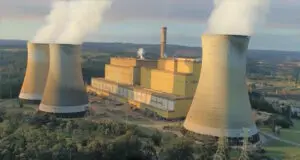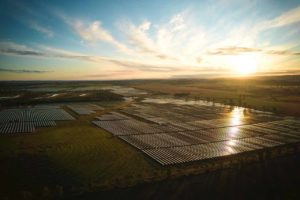National security is a defensive issue for Bill Shorten and Labor. The approach is to mimic the government at almost every step, lest a crack of difference between the two parties becomes a conservative wedge. We saw this again last week with the fear campaign on the medivac law.
But Labor can turn the table on the government’s security agenda by framing climate change action as the duty of government to protect the people — their livelihood, security and health — from the greatest risk of all to their future well-being and human security.
It will take courage from Labor, but the crushing impacts of climate change — devastating floods in Queensland, destruction of precious World Heritage forest in Tasmania, vital river systems without water, and an extraordinary, month-long, record-breaking heatwave covering most of Australia — are the material conditions on which a new climate and security narrative can be built.
The government is vulnerable to the charge that it is failing to act on this threat, but that requires climate change to be seen not as a green issue, or just about renewable energy, but as an escalating and potentially existential risk to human security in Australia, and to orderly relations between peoples and nations.
A platform for such an approach already exists. In September, all members of the Pacific Islands Forum (including Australia) supported the Boe Declaration that all Forum leaders “reaffirm that climate change remains the single greatest threat to the livelihoods, security and wellbeing of the peoples of the Pacific and our commitment to progress the implementation of the Paris Agreement”.
This exposes the conservatives’ vulnerability, because their professed concern for human security in the Pacific is dramatically undercut by continuing support and advocacy for the expansion of Australian coal and gas mining, including by Environment Ambassador Patrick Suckling at the climate talks in Poland in December.
Climate action advocacy was historically, and significantly still is, driven by environmental not-for-profit organisations (NGOs), who continue to frame climate as a green issue (“Stop Adani to save the Reef”, protecting nature, and so on). The organisations’ brands (conservation, wilderness, wildlife, environment) signify “green”, no matter what they say.
Most of the business community and the conservative elite largely dismiss the climate movement per se, and its green framing. The movement is less relevant to business and government than it often imagines. Business takes the movement’s claims to expertise in future economic opportunity with a large grain of salt, pondering whether their advocacy masks an anti-growth agenda.
There have been few attempts by environmental NGOs to engage conservative public and private elites in other framings. Yet it is crucial to construct a narrative that works across the political divide, given the hyper-partisan character of the climate issue in Australia.
In their hearts, most people value the same things: good relationships with friends and family, providing for and supporting their families and their safety and well-being, and making a positive social contribution. Safety is valued in all aspects of our lives: at home, at work, at school and on the roads.
The health, protection and safety frame — livelihood, security and well-being — presents climate change in ways that connects to core values and issues familiar to people and decision makers. It can activate and reinforce values of empathy, responsibility, community, fairness and opportunity, These worldviews are commonly held by both conservatives and progressives.
This approach extends to the sphere of international relations, where climate change has become a threat multiplier or accererant to instability, leading to increased human insecurity and conflict. This requires new approaches to building resilience in the most vulnerable countries, expanding aid and preparedness for disaster relief and humanitarian assistance.
The first finding of a Senate inquiry this year on these issues was that climate change represents an existential threat to Australia and its people. It also recommended increased funding for climate research and for foreign aid.
Understanding climate as an existential threat to Australians, and to the international order through state failure, conflict and the forced migrations of tens if not hundreds of millions of people, is a powerful and effective means of engaging senior levels in both the public and private sectors, because they are familiar with the risk and system change methodologies.
Former Defence chief Adm Chris Barrie has been outspoken in warning about the consequences for Australia of climate change, instability and population displacement in Asia.
The basis of democracy, according to the cognitive linguist George Lakoff, is “empathy — citizens caring for each other, both social and personal responsibility — acting on that care, and an ethic of excellence”. From these, our freedoms and our way of life follow, as does the role of government: to protect and empower a nation’s citizens. Lakoff says protection is part of the progressive moral system, but it has not been elaborated on enough.
On climate change, it has also not been well elaborated. By locating climate responses in a moral system of protection, the community can be better engaged in action to minimise future climate harm, and provide a non-partisan framing that will elicit a positive response from more conservative constituencies.
As well, it presents climate change — and extreme events such as bushfires — in a manner that gives climate-sceptical politicians little space to move, for they cannot deny that a government’s duty is to protect the people, and nor can they deny that climate change is now and will further damage the people.
More and more, conservative climate doubters in government are having trouble reconciling the increasing severe impacts on their constituents of extreme climate events, such as storms and bushfires, with their coal and gas advocacy.
It is in this space of the failure to protect the people, and their livelihood, security and well-being, that the conservative side of politics is vulnerable, and provides an opportunity for Labor to turn the table on a vexed issue.
David Spratt is Research Director for Breakthrough National Centre for Climate Restoration. This article was first posted at Climate Code Red. Reproduced here with permission of the author.







